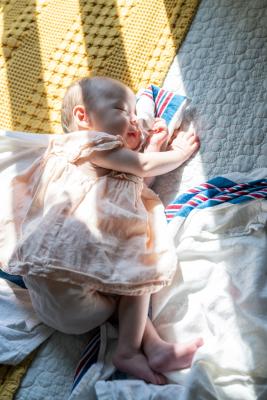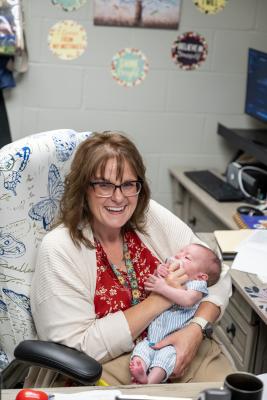In Missouri’s first prison nursery, incarcerated moms find healing, hope — and the power of motherhood

Story by Marcus Wilkins. Photos by Garry Brix.
“Mighty” Melody and “Little” Lyric’s chests rise and fall as their tiny fingers and toes periodically stretch mid snooze. Sunshine streaming from a nearby window warms the cushy rug where they lie and illuminates their angelic faces.
Kathy Briggs, the twins’ mother, who applied the nicknames to help others distinguish them by size, adjusts the 11-week-olds’ onesies to make sure they remain comfortable — and asleep. But as soon as Lyric starts to fuss, Melody squirms, too.

“One of the nannies taught me this little move,” says Briggs, forearm-scooping up Melody. “You pick up the big baby first and get her situated, then you grab the little baby and tuck her in on top.”
Briggs is one of three residents in the Women’s Eastern Reception, Diagnostic and Correctional Center (WERDCC) Prison Nursery Program, where incarcerated mothers can live with their babies for up to 18 months. The nannies, or caregivers, are also residents in the wing and have been selected to provide daycare services and support while moms complete continuing education courses.
The nursery, which opened in February, is the tenth of its kind in the U.S. and was made possible through bipartisan legislation passed in 2022 by the Missouri General Assembly and signed by former Missouri Governor Mike Parson. There are three babies at the facility — all girls — with one more on the way. A total of nine moms have entered the program since it opened.
“I’ve never really had anybody in my life, long term, to provide healthy support,” says Briggs who will live at Promises of Hope aftercare facility in Elsberry, Missouri, upon release. “Here, I’m learning to be a part of a whole, focus on more than just me and ask for help — and accept it — when I need it.”
Mentoring Motherhood

Amid the pastel quilts, cushioned nursing nooks and twirling mobiles twinkling gentle lullabies is a maternal warmth that permeates the wing. But make no mistake — it’s still a correctional facility that couldn’t operate without resident and staff buy-in.
Kim Perkins and Debra Moore — program manager and functional unit manager, respectively — form a dynamic duo of sorts. Perkins, with a background in social work, connects residents to resources and helps keep the moms on track toward personal growth. Moore, with 26 years of custody experience in the Missouri Department of Corrections (MODOC), ensures safety and security, addressing any disciplinary issues and making sure residents are following the rules.
In this environment, it also helps that both administrators are themselves mothers — of twins, incidentally — and can serve as mentors and role models.
“My daughter also has twins and my stepdaughter, too,” said Moore, who has provided plenty of advice for Briggs. “When she first arrived, Briggs had done time before and she was pretty rough — cussing at staff and putting up a lot of barriers. She has come a long way.”
Perkins and her team have incorporated events to foster camaraderie and build life-skills, such as community nights when the women enjoy a group activity or stay up late and watch a movie. They’ve learned how to prepare tuna noodle casserole, bake cookies and make Rice Krispies Treats — all with ingredients one might get with food stamps, WIC or a food pantry. They’ve even learned how to crochet.
“It has been wonderfully chaotic,” Perkins said. “New babies are a lot, and we’ve learned a lot along the way. We’ve gotten to know the strengths and weaknesses of each mom, helping them put the pieces together so that they can be stronger for themselves, for their baby and other children — because most of our moms have other children on the outside, too.”
Lessons Learned

In the day room — a sunny sanctuary lined with rocking chairs, cribs and brightly colored toys — Karen Clark coos at three-month-old Feenix, whose eyelids are getting heavy. Clark is serving her fourth sentence and is one of 10 resident caregivers — a number that was increased from eight after administrators realized the necessity.
“I have the best job in the Department of Corrections,” said Clark, smiling. “I’m able to share my experiences with the new mommies, and trust me — I’ve had a lot of loss because of my choices. I feel like, if I would have had something like this nursery my first time down, I wouldn’t have come back.”
On cue, Briggs enters the room to hand off the twins to Kelsey Merrill — another caregiver known for her innate ability to rock and soothe multiple babies at once. Briggs is off to class, while Merrill is less than a week from her release — just in time for her son’s seventh birthday.
“I’ve been down for three years, and I want to do something different this time,” Merrill says. “My boys were three and four when I left, and now they’ve been calling somebody else mom. It’s disheartening to know that it took this long for me to want to change.”
For Perkins, Moore and the rest of the WERDCC nursery team, teaching that kind of accountability is paramount to the residents’ potential success and, ultimately, reducing recidivism. For the new moms, these perfect bundles of joy are life’s most powerful manifestation of what’s at stake.
“When I’m having a bad day, it helps to just pick them up and walk them,” Briggs says. “It grounds me. I think God gave me two babies so whenever I feel like I might do something silly, I have one for each hand.”
